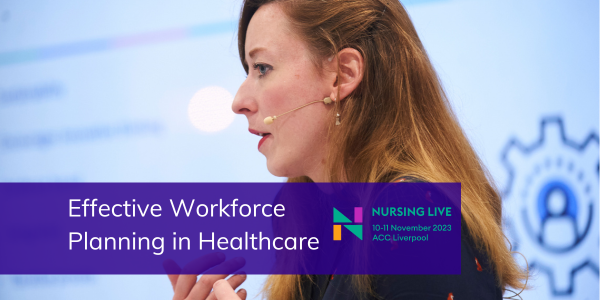
| 19 December 2023
Theresa Gatfield, Senior Consultant in Workforce Planning at Skills for Health hosted a session at Nursing Live to discuss ‘Effective Workforce Planning in Healthcare’. We asked her to share some key insights from the day and explore some of the common themes that arose.
I was honoured to receive an invitation to discuss the importance of workforce planning in healthcare at this year’s Nursing Live event—a two-day gathering organised by the Royal College of Nursing Institute (RCNi). Tailored specifically for nurses, this event brought together elements of professional development, effective collaboration, and self-care strategies to enrich careers and boost personal well-being.
My talk took place in a slightly smaller space than the main stage, yet the room was filled with great energy and excitement. There wasn’t an empty seat in sight – the audience were engaged and interactive, with lots of insightful conversations throughout. This piece is designed to share some key takeaways from the day, and discuss in some more detail, the importance of workforce planning.
Why is workforce planning so important in healthcare?
The recently launched NHS Long Term Workforce Plan outlines the NHS’s ambitions to tackle current and anticipated workforce issues by training and retaining thousands of staff over a 15 year period. Workforce planning is integral to both the NHS and the private (independent) healthcare sector too, making its importance and value even more significant.
It’s not a function separated from the operational elements of healthcare nor is it only performed at a high level limited to strategic planning. It needs to be embedded in an organisation entirely and requires data and information from many areas but also influences just as many too. It is also performed at different organisational levels from succession planning and CPD conversations line managers have to a system led plan.
What are the benefits of workforce planning?
Effective workforce planning plays a crucial part in delivering a sustainable workforce with the correct skills. During the session, we explored the benefits of effective workforce planning to raise awareness and challenge common misconceptions such as workforce planning being performed to reduce staff numbers or to unsustainably increase workloads. Effective workforce planning benefits service delivery, staff experience and wellbeing, patient experience and outcomes. It considers the current and future demand for services, the local demographics, and the budgeting constraints helping to create a sustainable service fit for the future.
Exploring the barriers and blockers
First off, there are several issues facing the healthcare sector regarding workforce planning. From having a lack of supportive and engaged stakeholders, to difficulties with recruitment and retention. By having an evidence-based workforce plan in place, it will help diminish a lot of these barriers to development and execution.
There are barriers with the supply of staff who have the correct skills and organisational culture in some environments hampering change. The focus needs to be on ensuring the right people, are in the right roles, with the right skills, crucially at the right time.
Next up is retention and recruitment; the key issues affecting the healthcare industry and a highlight on the most pressing issues to the nursing workforce. Something important to note is that retention issues must be tackled first before increasing recruitment activities to prevent a revolving door effect of newly recruited staff leaving. Workforce data such as reasons for leaving and length of service information can give valuable insights to the causes behind high turnover rates.
Six Step Methodology to Integrated Workforce Planning
I concluded by telling the audience about the Six Step Methodology to Integrated Workforce Planning, and how it enables the creation of a workforce plan to deliver effective workforce planning.
The Six Steps methodology provides a practical framework to support the development of a sustainable, realistic and evidence-based workforce plan. It is a proven methodology used extensively across healthcare and can be applied at many levels from system wide or multi-organisational plans to ones that only cover a single directorate or role. It is the only methodology cited in the NHS Long Term Workforce Plan as a tool that Integrated Care Boards (ICBs) can use to help develop workforce plans.
It identifies the elements that are needed in any workforce plan, considering the current and future demand for services, the local demographic situation, and the impact on other services – whilst helping you understand and work to a budget you can afford.
Final thoughts
Workforce planning is an iterative process which requires a degree of flexibility to adapt to the constantly changing healthcare workforce landscape. We need to approach it with innovative thinking and sharing ideas, extracting valuable lessons learned and identifying best practices for continual improvement.
One of the most interesting questions I was asked after my talk was how to promote a workforce plan that had no cost reductions in it and could potentially lead to a higher expense on the workforce. Workforce planning’s main aim is not financial savings, within healthcare it is improving staff and patient outcomes by having a sustainable workforce with the correct skills. However, financial savings can be made from these outcomes; increasing staff retention can decrease hiring costs, sickness rates and agency spend. Improving patient outcomes helps patients stay well and decrease the need for medical appointments.
Book a free initial consultation
We have specialists who can meet you virtually or face-to-face to discuss how to best implement Six Step Methodology to enhance your workforce strategy. Find out how we can help develop your integrated workforce to meet the needs of the future.
